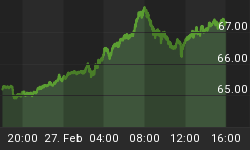At a time when more and more offices are going paperless, governments in most of the developed world are doing the opposite. Finance ministers from Washington to London, Tokyo, Madrid, and, most pointedly, Athens, are attempting to paper over gaping financial chasms in the global economy by issuing ever greater quantities of currency and debt. But paper can only stretch so far.
The key problem facing the western world is the 80-year decline in central banking discipline. In truth, these banks have become little more than the private piggy banks of their parent governments. Often furtively, central banks have "bought" ever larger amounts of government debt, which has allowed a consequence-deferred spending spree. The result has been decades of apparent economic growth and prosperity.
To close these gaps, it is widely agreed that governments need to curtail spending, but that inclination is nowhere evident. In a television appearance last week, former Fed Chairman Alan Greenspan explained the predicament bluntly: "[Public] spending is untouchable."
It is increasingly evident to ordinary Americans that big government demands big spending, financed by big taxes and big issues of government debt, ultimately cleared by big printing presses. They want it stopped, but the politicians won't budge.
Although this is clearly a problem, some have found a way to bury their heads in the sand. Early this week, Nobel Prize-winning economist Joseph Stiglitz said, "The likelihood of a default is so small, particularly in the United States, because all we do is print more to pay it back." Never does Stiglitz even consider that printing in such magnitude could have a downside. It is hard to imagine a more irresponsible view.
In the United States, the paper cascade has been dizzying. Paper debt from the originators of sub-prime mortgages, like Countrywide, became paper liabilities of larger institutions, like Bank of America, which, in turn, were rescued by yet more paper, issued by the U.S. Treasury. In addition, a growing number of irresponsible states, like California, are looking to the Treasury to issue still more paper, with which to rescue them.
America is not alone. In Europe, governments such as Portugal, Italy, Greece, Spain, France, and the United Kingdom have spent excessively and financed it with paper debt and debased currency. Now, there are urgent pleas for yet more paper to cover the cracks!
There seems to be no end to the amount of paper that politicians are prepared to print to fend off reality. But, in both America and Europe, financial markets and the people are rumbling.
Fifteen years ago, European bureaucrats introduced the euro currency on a fraudulent prospectus. Now, the people of Germany, and even Great Britain (which guaranteed an opt-out on the euro), are being pressured to pay for a bailout of the reckless Greek government. Needless to say, the citizenry is peeved. With additional sovereign bailouts likely, this popular reluctance may turn into civil opposition, if not unrest.
In America, recent Democrat reversals and the growth of the Tea Party movement indicate burgeoning popular discontent. In addition, last week's difficult Treasury auction of 10-year bonds could indicate the beginning of resistance in the international financial markets, as the U.S. government loses both political and financial credibility.
It appears that ordinary people in America and Europe increasingly believe that the paperless society should extend to their governments. Let's hope the politicians come around - before we're buried up to our necks.
For a more in-depth analysis of our financial problems and the inherent dangers they pose for the U.S. economy and U.S. dollar, read Peter Schiff's 2008 bestseller "The Little Book of Bull Moves in Bear Markets" and his newest release "Crash Proof 2.0: How to Profit from the Economic Collapse." Click here to learn more.
More importantly, don't let the great deals pass you by. Get an inside view of Peter's playbook with his new Special Report, "Peter Schiff's Five Favorite Investment Choices for the Next Five Years." Click here to download the report for free. You can find more free services for global investors, and learn about the Euro Pacific advantage, at www.europac.net.















